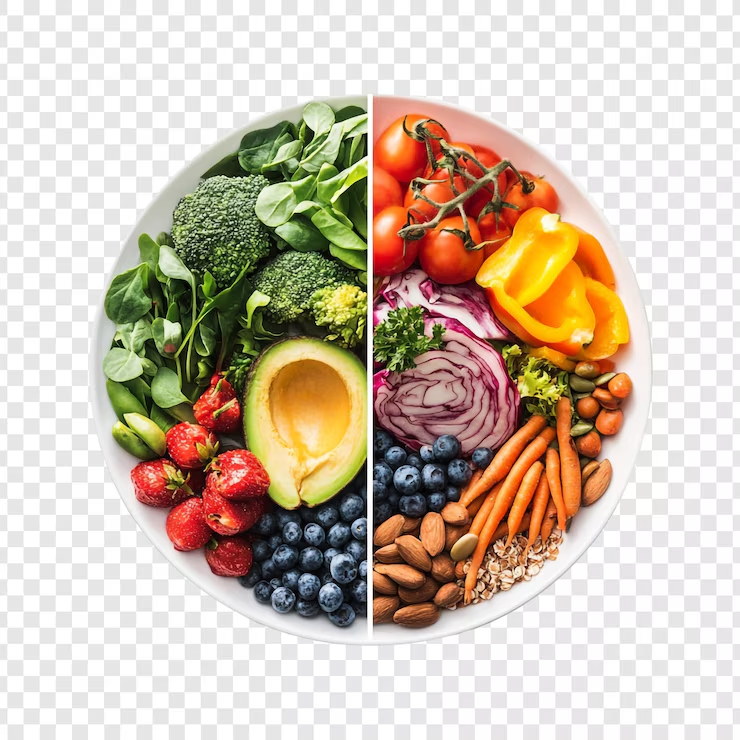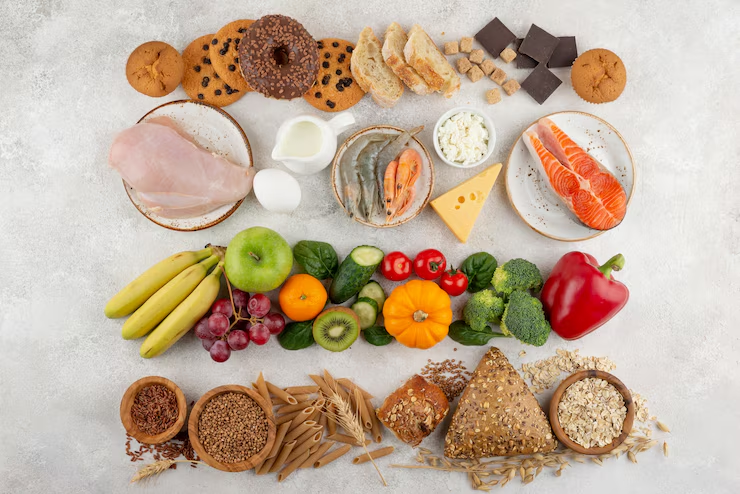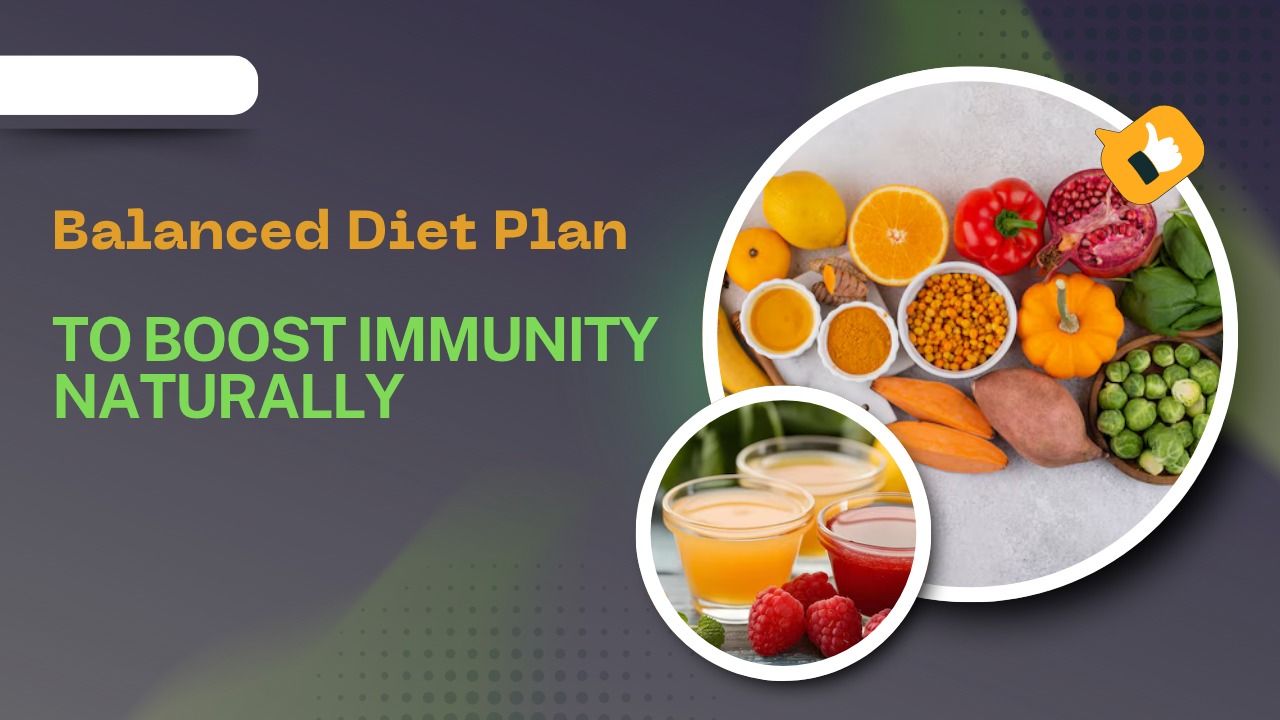A balanced diet is the foundation of good health, providing your body with the essential nutrients it needs to function at its best. This includes a variety of macronutrients—carbohydrates, proteins, and healthy fats—as well as vital vitamins and minerals. Eating a range of whole foods ensures your body stays energized and your organs work efficiently.
One of the key benefits of a balanced diet is its role in supporting the immune system, improving digestion, and maintaining a healthy weight. It also helps regulate blood sugar levels, boosts mental clarity, and reduces the risk of chronic diseases such as diabetes and heart conditions. Consistency and moderation are crucial to achieving these benefits.
With so many diets and food trends online, it’s easy to get confused. But a true balanced diet focuses on variety, portion control, and quality over quantity. Choosing fresh, minimally processed foods is the best approach to long-term health and wellness.
In this article, we will dive deep into the concept of a balanced diet, explore its benefits, and provide practical tips to incorporate it into your daily routine. Whether you’re a fitness enthusiast, a busy professional, or someone simply looking to live healthier, this guide will offer everything you need to know about the importance of nutrition.

What Is a Balanced Diet ?
A balanced diet refers to eating a wide variety of foods in the right proportions to provide your body with the nutrients it needs for optimal health. This includes the right mix of carbohydrates, proteins, fats, vitamins, and minerals, all of which play unique roles in keeping the body functioning properly. A diet that includes fruits, vegetables, whole grains, lean proteins, and healthy fats can help support everything from muscle repair to brain function.
Maintaining a balanced diet is essential for sustaining energy levels throughout the day, improving mental focus, and strengthening the immune system. It also supports proper digestion, hormone regulation, and cardiovascular health. When your body receives a steady supply of essential nutrients, it can perform daily tasks more efficiently and reduce the risk of chronic conditions such as obesity, diabetes, and heart disease.
Incorporating a balanced diet into your lifestyle doesn’t mean strict limitations or giving up your favorite foods. Instead, it’s about creating healthy habits, eating in moderation, and ensuring variety in your meals to nourish both the body and mind.
Key components of a balanced diet include:
Carbohydrates: Provide energy and fuel your body’s activities.
Proteins: Essential for building and repairing tissues, and supporting immune functions.
Fats: Help in the absorption of fat-soluble vitamins and provide essential fatty acids.
Vitamins & Minerals: Vital for the immune system, bone health, and cellular functions.
Water: Crucial for hydration, digestion, and temperature regulation.
A balanced diet should also be diverse, meaning it includes a wide range of food groups from the five food groups: fruits, vegetables, whole grains, lean proteins, and dairy or dairy alternatives.
How Does balanced diet ?
A balanced diet works by providing your body with the right proportions of essential nutrients—carbohydrates, proteins, fats, vitamins, and minerals—needed for optimal function. Each nutrient plays a unique role: carbohydrates give energy, proteins repair and build tissues, healthy fats support brain and hormone function, and vitamins and minerals regulate vital processes. When these elements are consumed in the right amounts, your body can perform efficiently and stay healthy.
One of the primary ways a balanced diet helps is by maintaining a stable metabolism and supporting digestion. Fiber-rich foods, such as whole grains, fruits, and vegetables, improve gut health, regulate blood sugar, and promote satiety. Protein keeps you feeling full, supports muscle maintenance, and aids in weight control, while healthy fats provide lasting energy and enhance nutrient absorption.
In the long term, following a balanced diet reduces the risk of chronic diseases such as obesity, type 2 diabetes, heart disease, and certain cancers. It also boosts immune function, improves mental clarity, and enhances overall well-being. By making mindful food choices, you support your body both inside and out, leading to a healthier and more balanced lifestyle.
Top Tips for Maintaining a Balanced Diet
Achieving and maintaining a balanced diet is simpler than it sounds. Here are eight practical tips that can help you develop healthy eating habits and take charge of your nutritional needs.
Incorporate a Variety of Foods into Your Diet
Eating a variety of foods is essential for maintaining overall health and preventing nutritional deficiencies. Each food group offers a unique set of vitamins, minerals, and other nutrients that support different functions in the body, from brain health to immune defense. Relying on just a few types of food can leave your body lacking important nutrients.

A simple yet effective strategy to ensure dietary variety is to make your meals colorful. Brightly colored fruits and vegetables, such as carrots, spinach, berries, and bell peppers, are often rich in antioxidants, fiber, and essential nutrients. The more colors on your plate, the more balanced and beneficial your meal is likely to be.
Including different food groups—such as whole grains, lean proteins, dairy or dairy alternatives, and healthy fats—ensures your body gets the fuel it needs. Embracing food diversity not only enhances nutrition but also keeps meals interesting and enjoyable for the long term.
Benefits:
Prevents nutritional deficiencies
Supports brain health and immune function
Enhances meal satisfaction and long-term health
Tip: Aim for at least five servings of fruits and vegetables daily, including a variety of colors. Each color typically represents a different set of vitamins and antioxidants, which can support different aspects of your health, from immunity to skin health.
Prioritize Whole Grains Over Refined Grains
Whole grains are an important component of a balanced diet and offer numerous health benefits. Foods like oats, brown rice, quinoa, and whole wheat bread are rich in fiber, B vitamins, iron, and magnesium. Unlike refined grains, which are stripped of their nutritious outer layers during processing, whole grains retain the bran and germ, making them a more nutrient-dense choice.
Incorporating whole grains into your balanced diet can help improve digestion, promote a feeling of fullness, and support healthy weight management. The high fiber content aids in regular bowel movements and helps control blood sugar levels by slowing down the absorption of glucose into the bloodstream.
Including a variety of whole grains not only adds texture and flavor to your meals but also enhances their nutritional value. For a truly balanced diet, aim to replace refined grain products with whole grain options whenever possible to support long-term health and wellness.
Benefits:
Improves digestion and bowel regularity
Stabilizes blood sugar levels
Promotes fullness and aids weight management
Tip: Swap refined grains for whole grains whenever possible. Start with breakfast by choosing oatmeal or whole grain cereal over processed options.
Include Lean Proteins in Every Meal
Protein is a crucial part of a balanced diet, playing a key role in repairing cells, building tissues, and supporting immune function. It also helps produce important enzymes and hormones that keep the body functioning efficiently. Getting enough protein each day is essential for maintaining muscle mass, especially during weight loss or as you age.

To maintain a balanced diet, it’s important to choose lean and healthy sources of protein. Foods like chicken, turkey, fish, eggs, tofu, lentils, and beans provide high-quality protein without excessive saturated fat. Plant-based proteins are also rich in fiber and other beneficial nutrients, making them great options for overall health.
Including protein in every meal can help you feel fuller for longer, manage hunger levels, and support metabolic function. Whether you follow a vegetarian or non-vegetarian eating style, ensuring adequate protein intake is a fundamental part of a well-rounded and balanced diet.
Benefits:
Builds and maintains muscle mass
Keeps you fuller for longer
Supports metabolism and immune function
Tip: Try to eat fish at least twice a week. Fatty fish, like salmon, mackerel, and sardines, are excellent sources of omega-3 fatty acids, which are beneficial for heart health.
Don’t Shy Away from Healthy Fats
Not all fats are harmful—in fact, healthy fats are an essential part of a balanced diet. These beneficial fats support various bodily functions, including brain health, hormone production, and the absorption of fat-soluble vitamins such as A, D, E, and K. Without adequate fat intake, your body may struggle to perform these critical functions efficiently.
Foods like avocados, nuts, seeds, and olive oil are excellent sources of healthy fats. When included in a balanced diet, these fats not only provide energy but also help reduce inflammation and support heart health. Unlike trans fats or excessive saturated fats, healthy fats contribute to overall wellness and longevity.
Additionally, healthy fats help you feel full and satisfied after meals, which can reduce unnecessary snacking and support weight management. By including moderate amounts of these fats in your balanced diet, you can enjoy flavorful meals while nourishing your body in a wholesome, sustainable way.
Benefits:
Enhances hormone production
Promotes heart and brain health
Increases meal satisfaction and reduces overeating
Tip: Replace saturated fats (found in fatty meats and full-fat dairy) with unsaturated fats. Use olive oil for cooking or add nuts and seeds to salads for a nutrient boost.
Hydrate, Hydrate, Hydrate
Water is a vital component of a balanced diet and plays a key role in maintaining overall health. It supports digestion, helps with the absorption of nutrients, regulates body temperature, and keeps joints lubricated. Without enough water, the body cannot perform these essential functions efficiently, leading to various health issues.
Dehydration can cause symptoms like fatigue, headaches, dry skin, and poor concentration. Even mild dehydration can affect your mood and energy levels. To support a balanced diet and proper bodily function, it’s important to stay well-hydrated throughout the day by drinking water regularly.
The general recommendation is to drink at least 8 cups (2 liters) of water daily, though individual needs may vary based on physical activity, climate, and overall health. Including water-rich foods like fruits and vegetables also contributes to your hydration. Staying properly hydrated complements your balanced diet, helping your body function at its best.
Benefits:
Aids digestion and nutrient absorption
Prevents fatigue, headaches, and poor concentration
Regulates body temperature and lubricates joints
Tip: Carry a water bottle with you throughout the day to remind yourself to drink regularly. Consider drinking water-rich foods like cucumbers, watermelon, and oranges for additional hydration.
Choose Healthy Snacks
Snacking plays a significant role in maintaining a balanced diet and can either support or hinder your health goals. Choosing the right snacks helps stabilize blood sugar levels, boost energy, and reduce the likelihood of overeating at your next meal. However, processed snacks high in sugar, salt, and unhealthy fats can lead to weight gain and poor nutrition.
To keep your snacking habits in line with a balanced diet, opt for nutrient-dense options rich in fiber, protein, or healthy fats. Great choices include a handful of nuts, yogurt with berries, hummus with veggie sticks, or apple slices with peanut butter. These snacks provide satiety and essential nutrients without the empty calories found in junk food.
Incorporating smart snacks into your daily routine can improve overall nutrition, prevent energy crashes, and support consistent healthy eating. Mindful snacking is a simple yet powerful way to maintain a well-rounded and balanced diet throughout the day.
Benefits:
Reduces cravings and prevents overeating at meals
Supports blood sugar balance
Provides sustained energy and nutrients between meals
Tip: Snack on raw veggies with hummus, Greek yogurt with fruit, or a handful of nuts and seeds. These options are not only nutritious but also help stabilize your blood sugar levels.
Limit Added Sugars and Processed Foods
Sugar is naturally found in foods like fruits, vegetables, and dairy, where it’s accompanied by fiber and essential nutrients. However, excessive intake of added sugars—those found in processed foods, soft drinks, and desserts—can negatively impact your health. A balanced diet requires limiting these added sugars to prevent various health concerns.

High consumption of added sugar has been linked to weight gain, tooth decay, and chronic illnesses such as type 2 diabetes and heart disease. Unlike natural sugars, added sugars offer little to no nutritional value and contribute empty calories, which can throw off the nutritional balance of your meals and hinder your health goals.
The World Health Organization recommends that added sugars should account for less than 10% of your total daily calorie intake. Reducing sugary foods and replacing them with whole fruits or natural sweeteners supports a healthier lifestyle and helps maintain a truly balanced diet in the long run.
Benefits:
Reduces risk of obesity, diabetes, and heart disease
Improves dental and metabolic health
Supports long-term weight control and energy balance
Tip: Read nutrition labels and avoid products with high sugar content. Opt for fresh fruit for sweetness or choose unsweetened alternatives like plain yogurt and almond milk.
Practice Portion Control
Portion control is a critical component of a balanced diet. While choosing nutritious foods is essential, consuming them in large quantities can still lead to excess calorie intake and unwanted weight gain. Even healthy options like nuts, fruits, and whole grains should be eaten in moderation to maintain proper energy balance.
Practicing portion control involves understanding serving sizes and recognizing when you’re truly hungry versus eating out of habit or emotion. By slowing down while eating and tuning into your body’s signals, you can avoid overeating and better support your balanced diet goals.
Using smaller plates, pre-portioning snacks, and avoiding eating straight from packages are practical strategies that make portion control easier. When combined with nutrient-rich foods, mindful eating helps you stay in control and maintain a healthy weight. Remember, a balanced diet isn’t just about what you eat—it’s also about how much you eat and when.
Benefits:
Helps maintain a healthy weight
Encourages mindful eating habits
Prevents calorie overload and supports digestive health
Tip: Use smaller plates, bowls, and utensils to help manage portion sizes. Practice mindful eating by savoring each bite and eating slowly, which helps prevent overeating.
Why Is a Balanced Diet Important ?
✅ Weight Management
Helps regulate body weight through proper portion sizes and nutrient-dense foods
Prevents both overeating and undernourishment
✅ Boosts Energy Levels
Provides steady energy throughout the day
Reduces energy crashes caused by sugary or processed foods
✅ Supports Immune Function
Rich in vitamins, minerals, and antioxidants
Strengthens the immune system and lowers the risk of infections and illness
✅ Improves Mental Health
Nutrient-rich foods like fatty fish, fruits, and leafy greens support brain function
Enhances mood and reduces the risk of anxiety and depression
✅ Promotes Longevity
Lowers the risk of chronic diseases such as heart disease, diabetes, and certain cancers
Encourages a longer, healthier, and more active life
Conclusion

Adopting a balanced diet is one of the most impactful choices you can make for your overall health and well-being. By prioritizing whole foods such as fruits, vegetables, lean proteins, whole grains, and healthy fats, you provide your body with the essential nutrients it needs to function properly. Limiting processed foods and refined sugars further supports your journey toward better health.
Maintaining a balanced diet also promotes mental well-being by stabilizing energy levels, supporting brain function, and improving mood. Proper portion control, mindful eating, and nutrient-dense meals can help reduce stress, prevent fatigue, and enhance emotional balance.
Start by making small, manageable changes—like choosing healthier snacks, drinking more water, or cooking more meals at home. Over time, these habits will lead to long-lasting improvements in your lifestyle. With consistency and balance, your balanced diet can become a powerful foundation for a healthier, more energized, and fulfilling life.
FAQs
Q1. What is a balanced diet and why is it important?
A balanced diet is one that includes a variety of foods in the right proportions to supply your body with essential nutrients—carbohydrates, proteins, fats, vitamins, and minerals. It helps maintain energy levels, supports bodily functions, boosts immunity, and promotes both physical and mental health. A balanced diet also plays a key role in preventing chronic diseases such as diabetes, heart disease, and obesity.
Q2. What are the key components of a balanced diet?
A balanced diet should include:
Fruits and vegetables (for fiber, vitamins, and minerals)
Whole grains (for sustained energy and digestion)
Lean proteins (for muscle repair and immune function)
Healthy fats (for brain health and hormone balance)
Dairy or dairy alternatives (for calcium and vitamin D)
Water and portion control are also essential parts of a balanced diet.
Q3. Can a balanced diet help with weight loss?
Yes, a balanced diet can support healthy weight loss by ensuring you get all necessary nutrients without consuming excess calories. Eating fiber-rich foods, lean proteins, and healthy fats promotes satiety and reduces cravings. Combined with portion control and regular physical activity, a balanced diet can lead to sustainable weight management.
Q4. How do I start eating a balanced diet?
Start by gradually replacing processed and sugary foods with whole, natural options. Fill half your plate with vegetables and fruits, choose whole grains over refined ones, include lean proteins in every meal, and cook with healthy fats like olive oil. Planning meals, reading nutrition labels, and staying hydrated are simple ways to build a balanced diet into your lifestyle.
Q5. Is it okay to have treats in a balanced diet?
Absolutely. A balanced diet is not about strict restrictions—it’s about moderation and variety. Occasional treats are perfectly fine as long as they don’t replace nutrient-rich foods or make up a significant portion of your daily calories. Enjoying your favorite foods mindfully can help you maintain a healthy relationship with food and stick to your dietary goals long-term.


